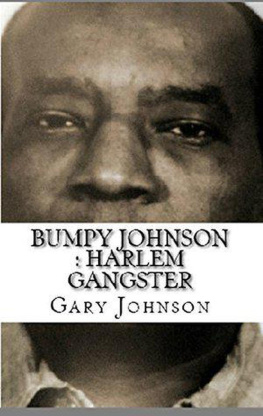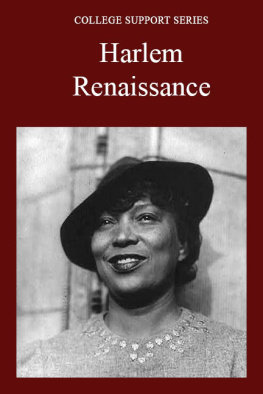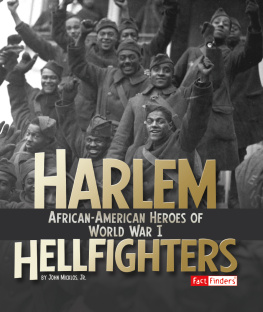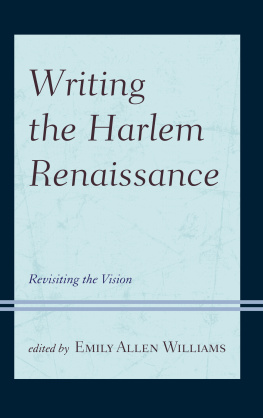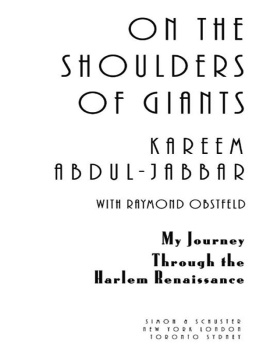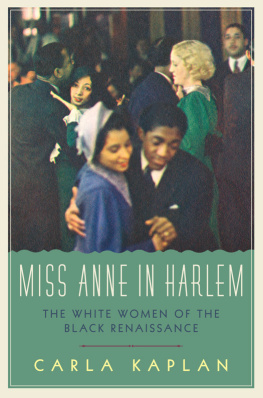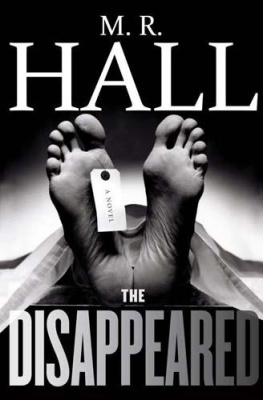Simon Hall - Ten Days in Harlem
Here you can read online Simon Hall - Ten Days in Harlem full text of the book (entire story) in english for free. Download pdf and epub, get meaning, cover and reviews about this ebook. year: 2020, publisher: Faber & Faber, genre: Politics. Description of the work, (preface) as well as reviews are available. Best literature library LitArk.com created for fans of good reading and offers a wide selection of genres:
Romance novel
Science fiction
Adventure
Detective
Science
History
Home and family
Prose
Art
Politics
Computer
Non-fiction
Religion
Business
Children
Humor
Choose a favorite category and find really read worthwhile books. Enjoy immersion in the world of imagination, feel the emotions of the characters or learn something new for yourself, make an fascinating discovery.
- Book:Ten Days in Harlem
- Author:
- Publisher:Faber & Faber
- Genre:
- Year:2020
- Rating:5 / 5
- Favourites:Add to favourites
- Your mark:
- 100
- 1
- 2
- 3
- 4
- 5
Ten Days in Harlem: summary, description and annotation
We offer to read an annotation, description, summary or preface (depends on what the author of the book "Ten Days in Harlem" wrote himself). If you haven't found the necessary information about the book — write in the comments, we will try to find it.
Ten Days in Harlem — read online for free the complete book (whole text) full work
Below is the text of the book, divided by pages. System saving the place of the last page read, allows you to conveniently read the book "Ten Days in Harlem" online for free, without having to search again every time where you left off. Put a bookmark, and you can go to the page where you finished reading at any time.
Font size:
Interval:
Bookmark:
For Jnos
The voice of our leader will be heard in every corner of the UN hall and in every corner of the world More than the voice of Cuba, Fidel will be the valiant voice of all the oppressed
CUBAN RADIO , 15 SEPTEMBER 1960
It was, to say the least, idiosyncratic behaviour for a prime minister. But, for Fidel Castro a man who liked to hold cabinet meetings at midnight, and who had a habit of turning up at hotel kitchens unannounced in the hopes of rustling up a quick meal it was entirely in character. One afternoon in early September 1960, the leader of Cubas revolutionary government was strolling along Calle Doce y Veintitrs, one of the chicest parts of Havana, famous for its art galleries, cinemas and cafes, while snacking on some spicy Creole oysters. It was a pastime that he had enjoyed many times while a student in the late 1940s. Suddenly, the Cuban prime minister made a beeline for a shoeshine boy, who was well known as the best source of gossip in the capital. What do you say I go up to New York, Fidel asked, smiling, and speak at the UN? Caballo,
Soon, all of Havana was buzzing with speculation that Fidel would be attending the Fifteenth Session of the UN General
Carlos Franqui, Family Portrait with Fidel: A Memoir (New York: Random House, 1984), 82.
Bonsal to Secretary of State, 6 September 1960, 320/9-660, College Park; Department of State, For the Press, no. 49, 21 January 1959, Nomination of Philip Wilson Bonsal to be Ambassador to Cuba, in DDE Office Files, Part 2, Reel 5, Cuba (2), RIAS.
Castro Plans U.N. Trip, Reports in Havana Say, New York Times, 12 September 1960, 3; R. Hart Phillips, Castro to Attend Assembly Session, NYT, 14 September 1960, 1.
During the early years of the revolution Fidel was known as El Caballo, The Horse which was the pictorial representation of the number one in the lottery. The origin of the nickname is ascribed to the popular Cuban entertainer Beny Mor, who is said to have exclaimed, Here comes the Horse, after hearing Castro pass by one night see Richard Gott, Cuba: A New History (New Haven: Yale University Press, 2004), 175.
Cuba certainly is going to remain hot
LIVINGSTON T. MERCHANT, US UNDER SECRETARY OF STATE FOR POLITICAL AFFAIRS , 8 APRIL 1960
The opportunity [for] antagonistic foreign leaders to come right on our doorstep and abuse us is one of the evils that goes with being host to the U.N.
SENATOR GORDON ALLOTT REPUBLICAN, COLORADO, 9 SEPTEMBER 1960
Fidel Castro champion of the oppressed, scourge of colonialism, critic of racial segregation, and beatnik revolutionary had certainly picked his moment to face down the Yankee imperialists in their own backyard. In the autumn of 1960, the US government was beset by a series of deepening crises. On the domestic front, Washington was confronted with intensifying demands from African Americans for equal rights, as a new generation of students launched a wave of direct-action protests that rocked the South and exposed President Eisenhowers gradualist approach to the race problem as hopelessly out of touch. Meanwhile, on the international stage, Americas leaders were scrambling frantically to counter a newly belligerent Soviet Union, which saw, in the rapid (and often chaotic) end of European empire, the chance to steal a march on her Cold War rivals.
For Fidel, the opportunity to add to Americas discomfort was far too good to pass up. During his stay in New York, which lasted from 18 to 28 September, the Cuban leader would receive a rapturous reception from the citys black community, hold court with a succession of political, intellectual and cultural luminaries including Malcolm X, Nikita Khrushchev, Gamal Abdel Nasser, C. Wright Mills and Allen Ginsberg and promote the politics of anti-imperialism, racial equality and leftist revolution with a fervour and an audacity that was to make him an icon of the 1960s counterculture, and his country a centre of the global anti-imperialist movement. Fidels sojourn in New York helped to place the Global South including his own Latin America at the very centre of the Cold War, while his new-found and very public closeness with Khrushchev, whom he met for the first time there, all but guaranteed a decisive and fateful rupture in USCuban relations. Meanwhile, his valorizing of black freedom fighters, celebration of Third World revolutionaries and association with radical chic offered an early glimpse of the cultural politics the fting of Black Power activists, open support for the Viet Cong and an instinctive condemnation of American empire that would soon become de rigueur for a generation of young leftists across the United States and Western Europe. Although no one knew it at the time, then, this brief trip proved to be both a turning point in the history of the Cold War and a foundational moment in the creation of what we think of as the Sixties.
*
The opening session of the Fifteenth General Assembly brought together an unprecedented galaxy of international statesmen, the like of which the United Nations and its predecessor, the League of Nations had seldom seen. Among the ten heads of state, thirteen prime ministers and seventy or more foreign ministers and other senior government ministers in attendance were some of the biggest global political stars of all: Dwight David Eisenhower, the thirty-fourth president of the United States and a Second World War hero; Nikita Khrushchev, the pugnacious leader of the worlds other superpower, the Union of Soviet Socialist Republics; the prime ministers of Great Britain, Canada and Australia; and major players from the Global South, including Jawaharlal
Rising out of the ashes of the Second World War, the United Nations symbolized the post-war hopes for a new international order. In the words of its founding charter, the organizations purpose was to save succeeding generations from the scourge of war, to affirm and protect fundamental human rights, and to advance the cause of social and economic progress.
Founded by its great power architects as an institution tolerant of empire (otherwise Britain and France, who had no intention of giving up their colonies without a fight, would never have supported it), the United Nations, according to the historian Mark Mazower, turned astonishingly quickly into a key forum for anti-colonialism.
Although the General Assembly lacked teeth and a two-thirds majority was needed to pass resolutions dealing with peace, security and other major issues, it came to serve as a major forum for debate and the shaping, and reshaping, of international opinion. As Mazower puts it, even though the UN had been established by the great powers, Third World nationalists took its universalism at face value, exploited its mechanisms, and fostered international public opposition to continued colonial rule.
*
As well as taking place at a key moment in the history of decolonization, the Fifteenth Session of the General Assembly was also opening against a wider backdrop of international tension. Despite a brief thaw in the Cold War, which had seen Khrushchev meet with Eisenhower at Camp David, Maryland, in September 1959, hopes for a meaningful rapprochement had quickly soured. In the bitter aftermath of the U-2 incident, in which an American spy plane had been shot down over Russia on 1 May 1960, Khrushchev lashed out at the perfidy of the United States. Storming out of disarmament talks in Paris later that month, the Soviet leader retaliated by ratcheting up the tension over Berlin. Deep in communist East Germany, the divided city which, fifteen years after the end of the Second World War, remained occupied by Britain, France, the United States and the Soviet Union was viewed by Khrushchev as a fishbone in his throat. The exodus of thousands of East Germans many of them young and well educated to the West via Berlin constituted an existential threat to the German Democratic Republic. Travelling back from Paris, Khrushchev had stopped off in East Berlin where, before an audience of 10,000 communists, he had denounced Eisenhowers treachery and, not for the first time, threatened to sign a separate peace treaty with the GDR a move that would bring an end to Western rights of occupation in the city. On 7 September, Allen Dulles, the CIA director, told President Eisenhowers National Security Council that Khrushchev appeared to be deliberately stirring up the Berlin situation in order to have it at boiling point by the opening of the General Assembly.
Font size:
Interval:
Bookmark:
Similar books «Ten Days in Harlem»
Look at similar books to Ten Days in Harlem. We have selected literature similar in name and meaning in the hope of providing readers with more options to find new, interesting, not yet read works.
Discussion, reviews of the book Ten Days in Harlem and just readers' own opinions. Leave your comments, write what you think about the work, its meaning or the main characters. Specify what exactly you liked and what you didn't like, and why you think so.

